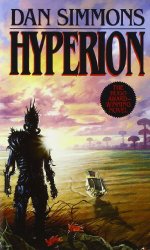 Chris reads all sorts of books on the Kindle, a lot of them those free-bee books that you often see rated highly because the author got all of his friends to write a review. So sometimes I’m a bit circumspect when he recommends a fantasy or science fiction book (for fear it’s one of these). However, after he and then someone else (and who that someone else was I can no longer remember, but thank you) recommended Hyperion, I decided to give it a go.
Chris reads all sorts of books on the Kindle, a lot of them those free-bee books that you often see rated highly because the author got all of his friends to write a review. So sometimes I’m a bit circumspect when he recommends a fantasy or science fiction book (for fear it’s one of these). However, after he and then someone else (and who that someone else was I can no longer remember, but thank you) recommended Hyperion, I decided to give it a go.
At first, I was completely overwhelmed. You’re dropped into this world (universe) in the distant future with an entirely new vocabulary that you may not understand but don’t give up hope, stick with it and much (not all) will be made clear. Plus you’ll be glad you did.
Anyway, without giving too much away, in the future humankind are scattered around the galaxy and divided into two factions, us and “outcasters”. Our group travels between planets in two different ways, the rich can use farcasters (not like Star Trek transporters, more like Star Gates that allow immediate transfers from one planet to another (the super rich even have houses built among multiple planets using this technology), or via “Hawking Drive” which is the “slower” form of travel where Einstein’s Theory of Special Relativity is going to come into play (i.e., the people traveling may take months to travel but for those they leave behind, years can elapse). The outcasters only use the long form version of travel.
In this galaxy, we meet seven people who have been selected to go on a pilgrimage to tombs more ancient than space-faring humankind where they will meet the Shrike, viewed as a killing machine by some, a god or messiah by others. Here’s where the book gets really interesting because the author reveals the story by having each pilgrim share his/her tale ala The Canterbury Tales. So motivations, fears, desires, are revealed to you and the other pilgrims all at the same time. It’s quite captivating.
Here’s the rub though, this is only the first book in a four book series, The Hyperion Cantos. Though in reality, you could probably be satisfied reading the first two alone and that’s the problem, because while I really enjoyed Hyperion, the second, The Fall of Hyperion, didn’t live up to its predecessor, but I’ll save those thoughts for my next review.
